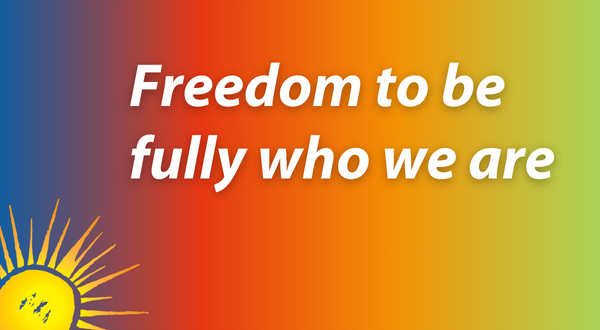Becoming, Belonging, and Beloved
Justice Demands the Freedom to Live the Truth of Who We Are Fully
Taylor Demby
October 30, 2025
What does it mean to live truthfully, not only for ourselves but for those who came before us and those who have yet to speak their truth? For LGBTQ+ people, this is both a celebration and a reminder that visibility is personal and political.
Every coming out story carries the weight of generations of struggle and courage, serving as an echo of the work of queer ancestors who risked everything so that others may live openly today. Young advocates have an ongoing responsibility to honor this legacy with faith, goodwill, and a strong commitment to justice.
Coming out is often depicted as a single moment of revelation, but I believe it’s better understood as a continual process of becoming. For some, coming out means naming a truth aloud for the first time. For others, it means choosing honesty in spaces where silence was once the safer option. In both forms, coming out is an act that insists on dignity. The decision to live authentically directly challenges systems that depend on factors like invisibility and shame to maintain control.
Coming out is both an inherent act of resistance and a testament to hope. Queer ancestors understood this deeply. Prominent figures like Audre Lorde, Sylvia Rivera, and Harvey Milk embodied great courage during their time, each finding revolutionary ways to blend honesty with love, protest, and compassion. They lived in eras that punished authenticity, yet their defiance came from a deeply rooted faith that truth, belonging, and acceptance would outlive fear.
Many more whose names we may never know quietly built the foundations of the communities we depend on today; their collective belief in a freer, more accepting world that could exist outside of their lifetimes continues to shape how we respond to injustice. Honoring the legacy of queer ancestors means not only remembering their names, but also emulating their radical belief in belonging. They didn’t fight courageously to be merely tolerated, they fought to be fully embraced.
We must understand the vital role that intersectionality plays in the perception of the LGBTQ+ community and the likelihood a queer person will be met with acceptance should they choose to come out. Intersectionality reminds us that identity, race, class, and faith shape each person’s journey differently.
A Black or Brown queer person may face racism within queer spaces and homophobia within their cultural or religious communities. Immigrant and undocumented individuals risk family separation or legal danger when they reveal who they are. Individuals with disabilities or people living in poverty may find that the material costs of honesty are steep. Recognizing these intersections helps us keep our understanding of coming out grounded in empathy and realism.
Approaching this legacy with faith and goodwill does not mean naive optimism. It means holding firm to the conviction that every single person deserves to be treated with dignity and care, not conditionally, not quietly, but fully. Solidarity with the LGBTQ+ community consists of dismantling the systems that treat acceptance as conditional or transactional and instead working to build a culture where everyone is free to be whole.
This work must be carried out in every corner of our communities, from classrooms to workplaces to places of worship. On a personal level, solidarity can look like offering quiet acts of reassurance in the form of a conversation, a letter, or a shared meal. These gestures should be offered with the genuine intention of reminding friends that they are seen, valued, and entirely embraced. These acts are expressions of faith as much as they are acts of justice.
As an advocate inspired by the principles of Catholic Social Justice, I seek to ground my advocacy work in the conviction that dignity and justice are inseparable. The common good demands that our social systems create conditions where we all can flourish. These values transcend religion and spirituality; they speak to a universal moral responsibility. When applied to the act of coming out, we’re challenged to look beyond tolerance and move toward radical acceptance; we’re challenged to build communities where authenticity isn’t met with discomfort or quiet approval, but with celebration, sincerity and care.
Taylor Demby is a sociology major at University of the Incarnate Word in San Antonio and a Sr. Carol Coston Fellow in NETWORK’s Young Advocates Leadership Lab (Y.A.L.L).








